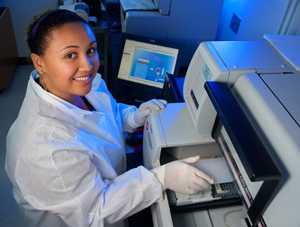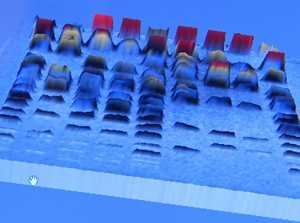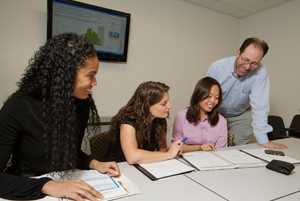Training and Outreach
PulseNet Training: PFGE Laboratory, Software Analysis, and MLVA Training
The success of PulseNet depends on its members being properly trained in PFGE, MLVA, and WGS methods as well as how to analyze the laboratory data using BioNumerics* software. As part of this effort, PulseNet USA and the Association of Public Health Laboratories provide training workshops for domestic and international PulseNet laboratory personnel. Workshops are held at least once a year to meet participants’ needs and include:
Workshops are held at least once a year to meet participants’ needs and include:
- Standardized molecular subtyping of foodborne bacterial pathogens by PFGE.
- Next generation sequencing using the Illumina MiSeq platform training
- BioNumerics* software analysis workshop for PulseNet participants
- Standardized MLVA laboratory training and analysiss
Standardized molecular subtyping of foodborne bacterial pathogens by pulsed-field gel electrophoresis training
 One key to detecting foodborne outbreaks is that all PulseNet laboratories closely follow the PulseNet Standardized PFGE protocol to ensure that PFGE fingerprints from different laboratories are comparable. CDC PulseNet conducts multiple hands-on trainings on how to generate PFGE fingerprints each year.
One key to detecting foodborne outbreaks is that all PulseNet laboratories closely follow the PulseNet Standardized PFGE protocol to ensure that PFGE fingerprints from different laboratories are comparable. CDC PulseNet conducts multiple hands-on trainings on how to generate PFGE fingerprints each year.
During this two-and-a-half day training, trainees perform each step of the PFGE protocol using a practice set of bacterial isolates. Training on laboratory methods is coordinated with the software analysis training. Trainees become proficient at analyzing the data they generate locally.
On average, CDC PulseNet trains about 22 scientists each year during its annual workshop. This total does not include special visits to CDC or other locations for training, or the troubleshooting help that CDC provides. From 2010 to 2015, CDC PulseNet trained 80 scientists (19 from international laboratories) in PFGE. These scientists returned to their home laboratories to become active participants in PulseNet.
Annually, CDC PulseNet staff help to establish PFGE in new international PulseNet labs.
BioNumerics* software analysis workshop for PulseNet participants
 The software analysis workshop provides participants with basic skills and information needed to analyze PFGE results using the highly customized software analysis program BioNumerics*, developed by Applied Maths*. Workshop participants receive hands-on experience using BioNumerics* to analyze patterns and search databases for matches. The participants also learn how to use vital communication tools and procedures to upload bacterial isolate information and gel images to the national databases.
The software analysis workshop provides participants with basic skills and information needed to analyze PFGE results using the highly customized software analysis program BioNumerics*, developed by Applied Maths*. Workshop participants receive hands-on experience using BioNumerics* to analyze patterns and search databases for matches. The participants also learn how to use vital communication tools and procedures to upload bacterial isolate information and gel images to the national databases.
- In 2015, PulseNet USA trained 42 scientists from 34 public health/regulatory laboratories during the inaugural BioNumerics* 7.5 Workshop for Analyzing WGS Data—Practical Bioinformatics for Microbiologists, held in Phoenix, Arizona before the InFORM2015 conference.
- More BioNumerics* 7.5 workshops will take place as the number of laboratories using whole genome sequencing increases.
PulseNet Outreach: Update meeting, Steering Committee, and PulseNet International
 Bi-annual PulseNet update meeting and steering committee
Bi-annual PulseNet update meeting and steering committee
Previously, PulseNet microbiologists and database managers presented and discussed their work at an annual update meeting. Now, this meeting is part of the Integrated Foodborne Outbreak Response and Management (InFORM) conference, which is held every other year and covers many aspects of enteric diseases that are important to state and local health departments.
During the update meeting (InFORM), the PulseNet steering committee, made up of scientists from CDC and member laboratories, charts the course for PulseNet in the coming years. The steering committee also meets quarterly via conference calls to provide updates on progress and to continue planning for future directions of the network.
- The 18th update meeting in 2015 drew an attendance of more than 475 microbiologists, epidemiologists, and environmental health professionals from the United States and eight other countries.
International Outreach through PulseNet International
Foodborne infections are a global problem. International travel and the worldwide import and export of foods allow foodborne diseases from one country to cause infections in other parts of the world. PulseNet International was developed to confront these challenges.
As part of PulseNet International Steering Committee, PulseNet USA scientists participate in building laboratory capacity to conduct molecular surveillance for foodborne infections. CDC PulseNet collaborates with international scientists to develop, validate, and implement standardized subtyping methods. This is accomplished through onsite training in subtyping techniques, support for development of surveillance methods, and communication about international outbreaks.
* Mention or depiction of any company or product does not constitute endorsement by CDC or HHS.
- Page last reviewed: February 16, 2016
- Page last updated: February 16, 2016
- Content source:


 ShareCompartir
ShareCompartir